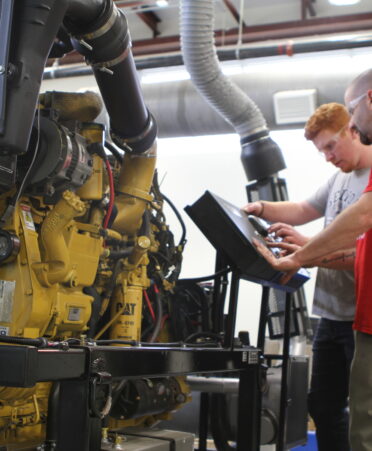(RED OAK, Texas) – Now is a great time to become a diesel equipment technician.
“Technology in our industry is constantly changing, from hybrid trucks that use electric axles to compressed natural gas engines being used now,” said Matthew Dobbs, lead instructor in the Diesel Equipment Technology program at Texas State Technical College in North Texas.
Dobbs said safety technology is being used on class 7 and class 8 trucks for accident mitigation.
“It’s not the dirty-black-smoke diesel trucks of the past anymore,” he said. “The exhaust systems prevent these new trucks from putting out the black smoke.”
Love’s Travel Stops & Country Stores has locations throughout the Dallas-Fort Worth area, including Ennis, Italy and Midlothian. Gary Price, the company’s executive vice president of truck care, said it is challenging to fill open diesel technician positions.
“A diesel technician is a highly specialized and skilled role that requires specific training because of the large quantity of diverse, heavy class 7 and 8 equipment on the highway,” he said.
Price said the company looks at potential employees’ positive attitudes, integrity, values and work ethics, along with their technical skills. The company has a diesel technician apprenticeship program, along with opportunities to attain management or Automotive Service Excellence level 6 mechanic status.
“Many of Love’s managers started from entry-level hourly positions,” Price said.
Philip Gurke, transportation director for the Waxahachie Independent School District, said his department looks for people with experience, particularly with school buses. The district has a fleet of 55 diesel engine buses.
“School buses are a different animal as far as the chassis, the drivetrain,” Gurke said.
Today’s buses come with multiplex wiring, sensors for wheelchair lifts, emergency exit alarms and other components that trained diesel technicians need to know how to fix.
Gurke said he is open to internships for high school and college students to shadow diesel technicians.
Those workers will have new skills to learn in the future. Gurke said the future of buses is electric, which the school district could slowly include in its fleet as charging technology improves and manufacturer training is offered.
According to the U.S. Department of Labor’s CareerOneStop website, bus and truck mechanics and diesel engine specialists make a yearly median salary of more than $48,000 in Texas. Texas will need more than 34,000 workers by 2028, according to the agency.
“We have excelled in placing our graduates in high-paying jobs,” Dobbs said. “We have an over 95% placement rate. Most of our students go to work in industry for a trucking company. They can advance as fast as they are willing to put in the work.”
TSTC offers an Associate of Applied Science degree in Diesel Equipment Technology – Heavy Truck Specialization and two Diesel Equipment Technology – Heavy Truck certificates of completion.
Dobbs said the program’s best students come in with a willingness to learn.
“We try to prepare them for exactly what they are going to see on the first day of the job,” Dobbs said. “Most are not going to walk right in and start rebuilding engines or transmissions. They start out small on trailers or do preventive maintenance on trucks and work their way up.”
For more information, go to tstc.edu.
